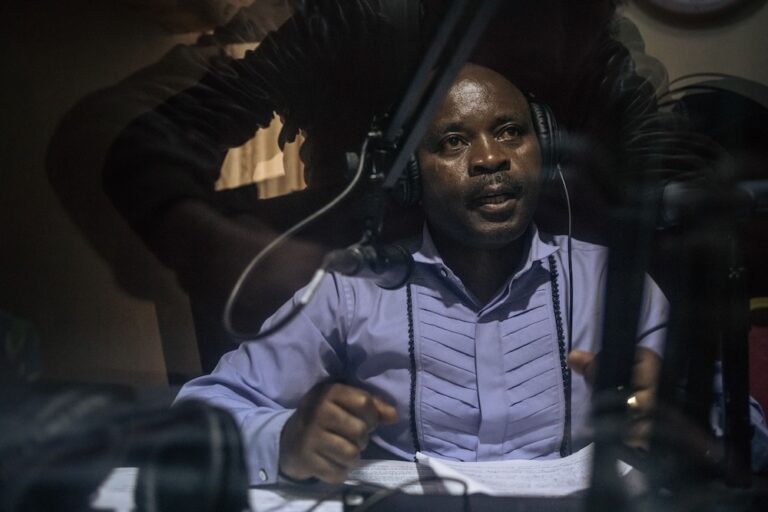(JED/IFEX) – In a 17 February 2009 letter to Paul Kabingwa Bundya Musombo, director of the Bukavu provincial division of the Postal, Telephone and Telecommunications Service (PTT), JED expressed “total disapproval” of a 16 February 2009 communiqué addressed by the director to the heads of radio and television stations in Bukavu and denounced the “absurd” […]
(JED/IFEX) – In a 17 February 2009 letter to Paul Kabingwa Bundya Musombo, director of the Bukavu provincial division of the Postal, Telephone and Telecommunications Service (PTT), JED expressed “total disapproval” of a 16 February 2009 communiqué addressed by the director to the heads of radio and television stations in Bukavu and denounced the “absurd” and uselessly provocative character” of the statement.
JED asked the head of the division to reconsider the terms of his communiqué and to not undertake any actions that would “undermine freedom of expression and opinion or harm the work of the media to ensure the return of peace and stability in eastern DRC.” JED stressed that no existing law in the DRC gives the PTT director the mandate to control the content of radio and television stations.
In the communiqué, a copy of which was provided to JED, Kabingwa accused radio and television stations of broadcasting messages from “anyone and everyone” and which were inclined “to oppose the actions of legitimate institutions of the Republic.” Kabingwa went on to forbid radio and television stations from broadcasting messages designed to “create confusion and misunderstanding among the population as to the actions of the legitimate authority” or even to organise broadcasts that might be viewed as “subversive” or “rebellious”. He assured stations that failure to abide by the new code would result in administrative and legal penalties, up to and including the revoking of transmission signals and/or the confiscation of transmission equipment.
JED notes that the freedom of expression of all Congolese citizens, including freedom of the press, is guaranteed by articles 23 and 24 of the Constitution, which asserts every person’s right to express ideas and opinions, by any means and without distinctions based on borders. Exceptions to the law, for reasons of public order and morality, must not be confused with the arbitrary will or mood of those in power, JED stressed.
JED emphasised in its letter that authorities must not attempt to impose their personal views by silencing dissonant voices but rather by persuading the people that their proposals for a lasting peace are the most sound. “This art of persuasion is the hallmark of any functioning democracy,” said JED. “Criticising government or using peaceful means to challenge the status quo in order to resolve the crisis in Kivu should never be considered unpatriotic.”


